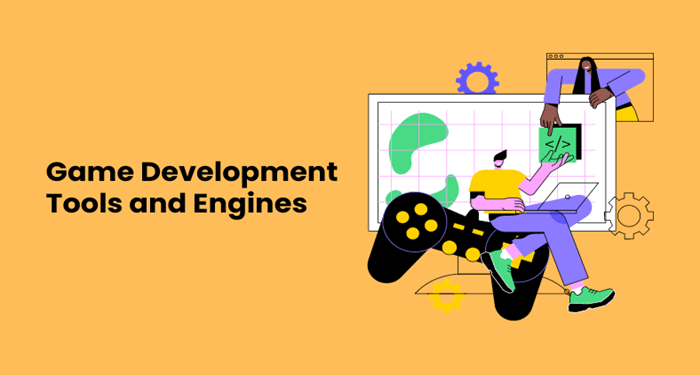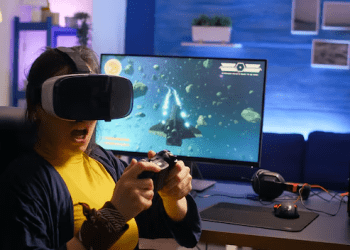Are you intrigued by the world of game development and aspire to become a game developer? Well, you’re in the right place! The path to mastering game development requires dedication, creativity, and, most importantly, the right set of tools and engines. In this blog, we’ll explore the essential game development tools and engines that will pave the way for your journey into the exciting realm of game creation. Whether you’re a seasoned developer looking to enhance your skills or someone brand new to Game Development Training, this will help you understand How to Become a Game Developer.
Game Development Tools
Before diving into the specifics of game engines, let’s start with the fundamental building blocks of game development; the tools that empower you to bring your game ideas to life.
Game Design Software
Game development starts with a compelling game concept and design. Tools like Unity’s ProBuilder and SketchUp allow you to create 3D models and design levels effortlessly. For 2D games, software like Adobe Photoshop or Aseprite will help you craft stunning visuals.
Integrated Development Environments (IDEs)
To write and debug your game’s code, you’ll need a capable IDE. Popular choices include Visual Studio, which supports multiple programming languages, and JetBrains’ Rider, known for its seamless integration with Unity.
Version Control Systems
As your game project evolves, version control becomes crucial for tracking changes and collaborating with a team. Git and platforms like GitHub provide a robust framework for managing your codebase.
Sound and Music Tools
Audio plays a significant role in creating immersive gaming experiences. Software such as Audacity for sound editing and software like FL Studio for music composition can be invaluable.
3D Modeling and Animation Software
For 3D games, software like Blender or Autodesk Maya enables you to create character models and animate them realistically. In the world of 2D, Spine or DragonBones offer efficient skeletal animation solutions.
Asset Management Tools
Keeping track of your game’s assets, such as textures, models, and sound files, can become overwhelming. Tools like Trello or Asana can help you stay organized and streamline your development pipeline.
Game Engines
Now that we’ve covered the essential tools let’s shift our focus to the game engines that serve as the heart and soul of game development. These engines provide the framework and environment for building, testing, and deploying games efficiently.
Unity
Unity is a widely-known game engine that is highly regarded in the industry due to its versatility and user-friendly interface. Unity is a popular choice for game development, supporting 2D and 3D and offering a vast asset store. It’s an excellent starting point for developers of all skill levels.
Unreal Engine
Developed by Epic Games, Unreal Engine boasts stunning graphics capabilities, making it a top choice for creating visually impressive games. Unreal’s Blueprint visual scripting system allows developers with limited coding experience to create complex game logic.
Godot Engine
An open-source alternative, Godot is gaining traction for its user-friendly interface and flexibility. It’s excellent for 2D and 3D game development and comes with a built-in scripting language that’s easy to learn.
CryEngine
If you’re looking to create visually breathtaking games, CryEngine is a top contender. It’s renowned for its graphical prowess and realistic lighting effects. While it may have a steeper learning curve, the results are worth the effort.
Lumberyard
Amazon’s Lumberyard engine is a powerful option for creating multiplayer and online games. It is suitable for developers interested in online gaming experiences with built-in features for cloud integration.
GameMaker Studio
GameMaker is an excellent choice for beginners or those interested in 2D game development. It offers a drag-and-drop interface for visual scripting and a scripting language (GML) for more advanced developers.
Choosing the Right Engine for You
Selecting the right game engine is a crucial decision in your journey to become a game developer. Here are some factors to consider when making your choice:
Skill Level
If you’re new to game development, Unity or Godot might be the best starting point due to their user-friendly interfaces and extensive documentation. However, if you’re already well-versed in programming, Unreal Engine’s capabilities might be a more attractive option.
Game Type
Consider the type of game you want to create. Some engines are better suited for 2D games, while others shine in the 3D realm. Research and assess which engine aligns with your project’s requirements.
Community and Support
The strength of an engine’s community and available resources is vital. Engines like Unity and Unreal have thriving communities, which means you’ll have access to tutorials, forums, and assets.
Cost
Some engines, like Unity and Godot, offer free versions with limitations, while others, like Unreal Engine, have royalty-based models. Factor in your budget and the potential costs associated with your chosen engine.
Becoming a Game Developer
Now that you’ve been introduced to the essential game development tools and engines let’s outline a roadmap for your journey to becoming a game developer:
Learn the Basics
Begin by acquiring fundamental programming and game design knowledge. Online courses, game development training programs, and tutorials are excellent resources.
Choose Your Specialization
Determine whether you want to focus on programming, art, design, or a combination of these disciplines. Specializing in one area while understanding the others is common in the industry.
Select Your Tools
Based on your specialization and project requirements, choose the appropriate tools and game engine to get started.
Practice, Practice, Practice
Apply what you’ve learned by working on small game projects. Start simple, and gradually increase the complexity of your creations.
Join a Community
Engage with fellow developers through forums, social media, and local meetups. Networking can open doors to collaboration and job opportunities.
Continuously Learn
Game development is a constantly evolving field, and to remain competitive, it’s important to stay up-to-date with the latest trends, technologies, and tools.
Build a Portfolio
Showcase your best work in a portfolio that highlights your skills and expertise. A strong portfolio is essential when seeking employment or freelance opportunities.
Conclusion
Becoming a game developer is an exciting and rewarding journey, and the right game development tools and engines are your indispensable companions along the way. Whether you’re a novice embarking on game development training. Programming & DevOps Courses looking to expand your horizons, the tools and engines discussed in this blog offer the means to bring your gaming dreams to life with dedication, practice, and a creative spirit.










